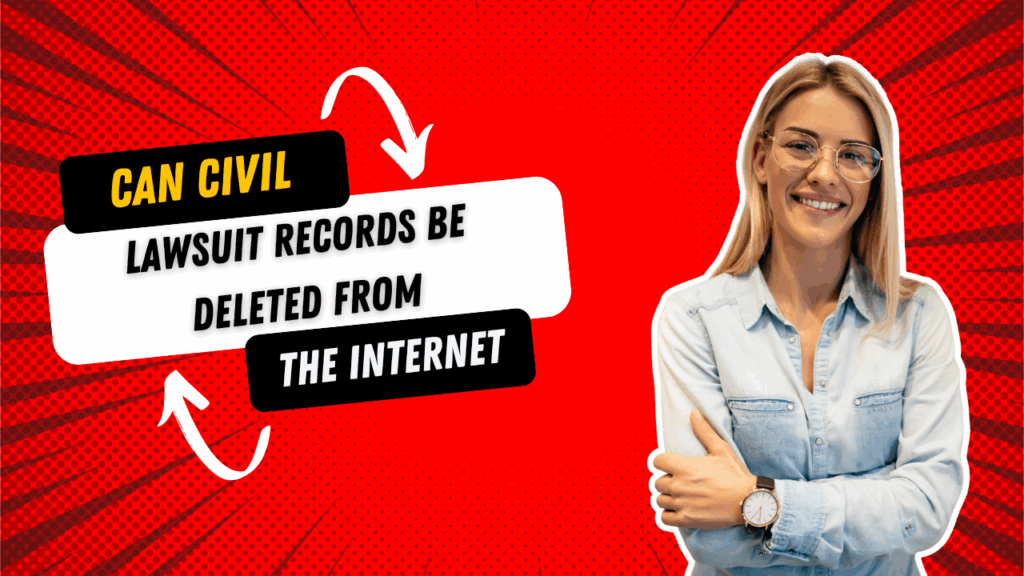If you were involved in a civil lawsuit, chances are it shows up somewhere online. Court sites. News sites. Even random background check databases. You might be wondering if there’s any way to delete that record from the internet. The answer: sometimes. But not always.
Dig Deeper: How to Remove Court Records from Google Search
Why Civil Lawsuit Records Are Hard to Erase
Court Records Are Public
Most civil lawsuits are public record. That means once your name is part of a court filing, it’s usually fair game for websites to post. Courts publish dockets and decisions on public databases. Some even partner with third-party aggregators.
If someone searches your name, those court listings might show up near the top of Google results. The internet never forgets.
Third-Party Sites Copy Everything
Sites like Justia, Law360, and even random people-search sites often grab court data and re-publish it. They don’t always update or remove old info, even if the case was dropped or resolved years ago.
One user told us, “My case was dismissed, but the same old lawsuit still pops up when someone Googles me. I emailed four different sites before one finally removed it.”
News Articles Stick Around
Even if a civil lawsuit was short-lived, if it was covered by the media, it could live on forever. News sites aren’t required to remove accurate stories. And Google indexes those stories fast. That means they can outrank newer, more relevant results.
When You Can Remove Civil Lawsuit Records
Sealed or Expunged Cases
If your case was sealed by a judge, the court may remove it from public view. Once sealed, you may be able to contact sites that reposted the info and ask them to take it down.
You’ll need proof. Get a copy of the sealing or expungement order and send it with your request. Some sites will cooperate. Others might ignore you.
Settlement Agreements with Confidentiality
In rare cases, your lawsuit settlement might include a clause requiring both parties to keep it private. If the case still shows up online, you might have a legal basis to request removal. But this depends on how the data got online in the first place.
Google Content Removal Tools
If the court document includes sensitive personal information, like your Social Security number or home address, Google might take it down. Use their personal information removal request form.
Keep in mind this only hides the result from Google Search. It does not delete the content from the original site.
What You Can Do If Removal Isn’t an Option
Suppress the Record with Positive Content
If deletion isn’t possible, suppression is your best friend. The idea is simple. Flood search engines with better, newer content so the court case gets buried.
- Make a personal website with your name in the domain
- Write blogs, opinion pieces, or guest posts
- Update LinkedIn and other profiles with your full name
The goal is to create enough strong, relevant content to push the lawsuit listing past page one.
Contact the Website Directly
Many background check and court record sites have opt-out forms. These don’t always apply to civil cases, but it’s worth trying. When reaching out:
- Be polite and professional
- Include a link to the page you want removed
- Offer proof the case is closed or dismissed, if available
Persistence helps. Follow up if you don’t hear back.
Work with a Reputation Management Service
If this feels like too much to handle, you can always work with a professional. A reputation management service like Top Shelf Reputation can help:
- Suppress or push down civil lawsuit results
- Contact websites on your behalf
- Monitor for new mentions and updates
Common Myths About Civil Lawsuit Removal
“I Won My Case, So It Shouldn’t Be Online”
Unfortunately, the outcome doesn’t matter. Public court records are based on access, not fairness. Even dismissed or won cases can stay online.
“Google Will Delete It If I Ask”
Google only removes content in very specific cases, like clear personal info or legal violations. A civil lawsuit doesn’t usually meet that bar.
“If I Wait Long Enough, It’ll Disappear”
That might work for your memory, but not for the internet. Old court records can live online for decades unless removed or buried.
Final Tips and Takeaways
If your name is tied to a civil case online, here are your steps:
- Check if the case was sealed, expunged, or dismissed
- Gather proof of resolution or error
- Contact the website that posted it and request removal
- Use Google’s removal form if personal info is listed
- Create positive content to outrank the court record
- Get help from a professional if needed
You can’t erase everything, but you can push it down, clear it from Google, or make it harder to find. Take control of your search results instead of letting an old lawsuit define your future.
The internet isn’t always fair. But with the right approach, it can be manageable.
Need help? Top Shelf Reputation specializes in managing court records online, even when they can’t be fully removed. Contact us today to take back control of your online image.

